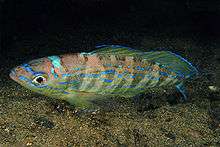Spicara smaris
| Spicara smaris | |
|---|---|
 | |
| Scientific classification | |
| Kingdom: | Animalia |
| Phylum: | Chordata |
| Class: | Actinopterygii |
| Order: | Perciformes |
| Family: | Sparidae |
| Genus: | Spicara |
| Species: | S. smaris |
| Binomial name | |
| Spicara smaris (Linnaeus, 1758)[1] | |
| Synonyms[2] | |
| |
Spicara smaris, the picarel, is a species of ray-finned fish native to the eastern Atlantic Ocean, the Mediterranean Sea and the Black Sea. It grows to a maximum length of about 20 cm (8 in); females are usually smaller than males.
Description
Spicara smaris grows to a maximum length of 20 cm (8 in) but a more common maximum size is 15 cm (6 in). It is a more slender fish than the closely related blotched picarel (Spicara maena) and can be distinguished from that species by having 75–81 scales along the lateral line rather than 68–70. Its back is grey-brown and it has silvery flanks with a large black spot located above the tip of the pectoral fin. Male fish are usually larger than females and have small blue spots scattered across the dorsal and anal fins.[3]
Distribution and habitat
Spicara smaris is native to the subtropical eastern Atlantic Ocean including the coasts of Portugal, the Canary Islands and Morocco, the Mediterranean Sea and the Black Sea.[4] It is usually found in seagrass meadows and over sandy and muddy seabeds. Its depth range is generally 15 to 170 m (49 to 558 ft) but it has been recorded at depths of 328 m (1,076 ft) in the eastern Ionian Sea.[1]
Biology
Spicara smaris is a sociable fish, forming large groups with others of its species.[1] It is a protogynous sequential hermaphrodite, individuals maturing as females and becoming males at some later point.[5] All individuals over about 17.9 cm (7.0 in) are male and the maximum age for a male is six years while for a female it is four.[6] Breeding takes place once a year and the colour of a male becomes brighter at this time. The male will scoop out a nest in soft sediment in which the female will lay eggs. The male then guards these until they hatch, after which time his bright colours fade and he rejoins other schooling fish.[5]
Classification
Spicara smaris has been removed from the family Centracanthidae and placed in family Sparidae in 2014.[1]
References
- 1 2 3 4 "Spicara smaris". FishBase. Retrieved 2014-03-25.
- ↑ Bailly, Nicolas (2013). "Spicara smaris (Linnaeus, 1758)". World Register of Marine Species. Retrieved 2014-03-24.
- ↑ Kramm, N. (2008). "Picarel (Spicara smaris)". Archipelagos Wildlife Library. Archipelagos, Institute of Marine Conservation. Retrieved 2014-03-24.
- ↑ "Spicara smaris". Fishes of the NE Atlantic and the Mediterranean. Marine Species Identification Portal. Retrieved 2014-03-24.
- 1 2 "Reproduction of Spicara smaris". FishBase. Retrieved 2014-03-25.
- ↑ Dulčić, J.; Pallaoro, A.; Cetinić, P.; Kraljević, M.; Soldo, A.; Jardas, I. (2003). "Age, growth and mortality of picarel, Spicara smaris L. (Pisces: Centracanthidae), from the eastern Adriatic (Croatian coast)". Journal of Applied Ichthyology. 19 (1): 10–14. doi:10.1046/j.1439-0426.2003.00345.x.